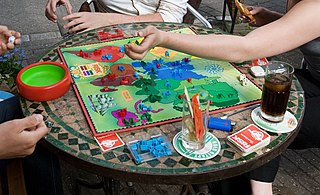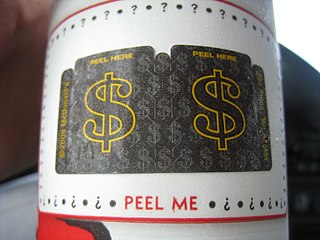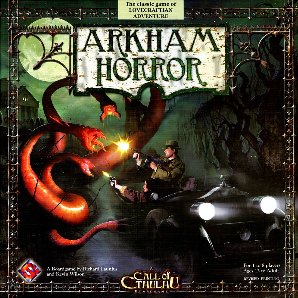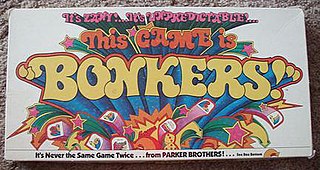This article needs additional citations for verification .(November 2021) |
Landslide is a board game about the U.S. presidential elections published by Parker Brothers in 1971.
This article needs additional citations for verification .(November 2021) |
Landslide is a board game about the U.S. presidential elections published by Parker Brothers in 1971.
Landslide, a board game for 2–4 players published by Parker Brothers in 1971, uses the mechanics of the United States Electoral College to simulate an American presidential election. The objective of the game is to obtain as many electoral votes as possible by bidding with "currency" representing each player's share of the popular vote.
The game has the following components:
The game follows the 1970 census, and it correctly represents the electoral college apportionment for each state at that time. For example: New York is apportioned 41 electoral votes, representing its 39 congressmen and two senators.
The board features a circular track in which players move their tokens to land on spaces that have various rewards or triggered game action. [1] The country and states are divided into 4 regions (East, South, Midwest, West) and the circular track is divided into these four sections as well. The player tokens and regions are color coordinated: East = red, South = yellow, Midwest = white, and West = blue. Each player starts on the space called "Home State" in their respective color/region and starts with five vote cards, which range in value from 250,000 to 5,000,000 votes. Players roll a single die to continuously circumnavigate the board, triggering various actions until all 50 states and the District of Columbia (with its three electoral votes) are in the possession of the players. [1]
The various spaces on the board are as follows:
When ownership of the last state has been decided, the player with the most electoral votes is the winner. [1]
In the March 1989 edition of Games International (Issue #3), Alan R. Moon criticized the game's lack of originality, saying, "Pretty basic stuff here. You could probably find other earlier (and later) games from Parker Brothers with exactly the same play mechanics." [1]
In 2004, Ezakly published a board game, also titled Landslide, that was unrelated to the Parker Brothers game in either appearance or game mechanics, having a Monopoly -style track around the perimeter of the board.

Monopoly is a multi-player economics-themed board game. In the game, players roll two dice to move around the game board, buying and trading properties and developing them with houses and hotels. Players collect rent from their opponents, aiming to drive them into bankruptcy. Money can also be gained or lost through Chance and Community Chest cards and tax squares. Players receive a stipend every time they pass "Go" and can end up in jail, from which they cannot move until they have met one of three conditions. House rules, hundreds of different editions, many spin-offs, and related media exist. Monopoly has become a part of international popular culture, having been licensed locally in more than 103 countries and printed in more than 37 languages. As of 2015, it was estimated that the game had sold 275 million copies worldwide.

Risk is a strategy board game of diplomacy, conflict and conquest for two to six players. The standard version is played on a board depicting a political map of the world, divided into forty-two territories, which are grouped into six continents. Turns rotate among players who control armies of playing pieces with which they attempt to capture territories from other players, with results determined by dice rolls. Players may form and dissolve alliances during the course of the game. The goal of the game is to occupy every territory on the board and, in doing so, eliminate the other players. The game can be lengthy, requiring several hours to multiple days to finish. European versions are structured so that each player has a limited "secret mission" objective that shortens the game.

Pay Day is a board game originally made by Parker Brothers in 1974. It was invented by Paul J. Gruen of West Newbury, Massachusetts, United States, one of the era's top board game designers, and his brother-in-law Charles C. Bailey. It was Gruen's most successful game, outselling Monopoly in its first production year. Pay Day is currently marketed by Winning Moves Games USA.

A Game of Thrones: The Card Game is an out-of-print collectible card game produced by Fantasy Flight Games. It is based on A Song of Ice and Fire, a series of novels written by George R. R. Martin. The first set was Westeros Edition and was released in August 2002. It has since won two Origins Awards. The game's primary designer is Eric Lang, the lead developer is Nate French, with Damon Stone serving as associate designer.
In tabletop games and video games, game mechanics are the rules or ludemes that govern and guide the player's actions, as well as the game's response to them. A rule is an instruction on how to play, a ludeme is an element of play like the L-shaped move of the knight in chess. A game's mechanics thus effectively specify how the game will work for the people who play it.

Advance to Boardwalk is a 1985 spin-off of the Parker Brothers board game Monopoly.

SolarQuest is a space-age real estate trading board game published in 1985 and developed by Valen Brost, who conceived the idea in 1976. The game is patterned after Monopoly, but it replaces pewter tokens with rocket ships and hotels with metallic fuel stations. Players travel around the sun acquiring monopolies of planets, moons, and man-made space structures. They seek to knock their opponents out of the game through bankruptcy, as well as optional laser blasts and dwindling fuel supplies.

The McDonald's Monopoly game is a sales promotion run by fast food restaurant chain McDonald's, with a theme based on the Hasbro board game Monopoly. The game first ran in the U.S. in 1987 and has since been used worldwide.
Monopoly Junior is a simplified version of the board game Monopoly, designed for young children, which was originally released in 1990. It has a rectangular board that is smaller than the standard game and rather than using street names it is based on a city's amusements to make the game more child-friendly. There are many different models of the game.

Evo: The Last Gasp of the Dinosaurs is a German-style board game for three to five players, designed by Philippe Keyaerts and published by Eurogames. The game won the GAMES Magazine award for Game of the year 2002. It was nominated for the Origins Award for Best Graphic Presentation of a Board Game 2000. In 2004 it was nominated for the Hra Roku. The game went out of print in 2007, and a second edition was released in 2011.
A Game of Thrones is a strategy board game created by Christian T. Petersen and published by Fantasy Flight Games in 2003. The game is based on the A Song of Ice and Fire series of high fantasy novels by George R. R. Martin. It was followed in 2004 by the expansion A Clash of Kings, and in 2006 by the expansion A Storm of Swords.

Arkham Horror is a cooperative adventure board game designed by Richard Launius, originally published in 1987 by Chaosium. The game is based on Chaosium's roleplaying game Call of Cthulhu, which is set in the Cthulhu mythos of H.P. Lovecraft and other horror writers. The game's second edition was released by Fantasy Flight Games in 2005, with a third edition in 2018.

Bonkers! is a race-style board game designed by Paul J. Gruen and produced first by Parker Brothers, later by Milton Bradley, and briefly reissued by Winning Moves. The object is to be the first player to score 12 points by adding instruction cards to the empty spaces in an attempt to move to several scoring stations. The game's slogan is "It's Never the Same Game Twice!"

A bidding box is a device used for bidding in bridge, usually in duplicate bridge competitions. Made in various configurations and sizes, it is typically a plastic box with two holding slots, each containing a set of bidding cards: one with 35 cards with symbols of bids, and the other with cards for other calls.

The board game Monopoly has its origin in the early 20th century. The earliest known version, known as The Landlord's Game, was designed by Elizabeth Magie and first patented in 1904, but existed as early as 1902. Magie, a follower of Henry George, originally intended The Landlord's Game to illustrate the economic consequences of Ricardo's Law of economic rent and the Georgist concepts of economic privilege and land value taxation. A series of board games was developed from 1906 through the 1930s that involved the buying and selling of land and the development of that land. By 1933, a board game had been created much like the modern version of Monopoly sold by Parker Brothers and its related companies through the rest of the 20th century, and into the 21st. Several people, mostly in the midwestern United States and near the East Coast of the United States, contributed to design and evolution.
Easy Money was a board game introduced by Milton Bradley Company in 1935. Like Monopoly, the game is based on The Landlord's Game in the movement of pieces around the board, the use of cards, properties that can be purchased, and houses that can be established on them.
A number of related games under the Yahtzee brand have been produced. They all commonly use dice as the primary tool for game play, but all differ generally. As Yahtzee itself has been sold since 1954, the variants released over the years are more recent in comparison, with the oldest one, Triple Yahtzee, developed in 1972, eighteen years after the introduction of the parent game.

Monopoly: The Mega Edition is a special variant of the popular board game Monopoly. The game was first published in 2006 by Winning Moves Games USA in the USA. A UK version was adapted in 2007.
The Genius: Rules of the Game is the first season of The Genius debuted on tvN on April 26, 2013.
The Genius: Rule Breaker is the second season of The Genius, which debuted on tvN on December 7, 2013.